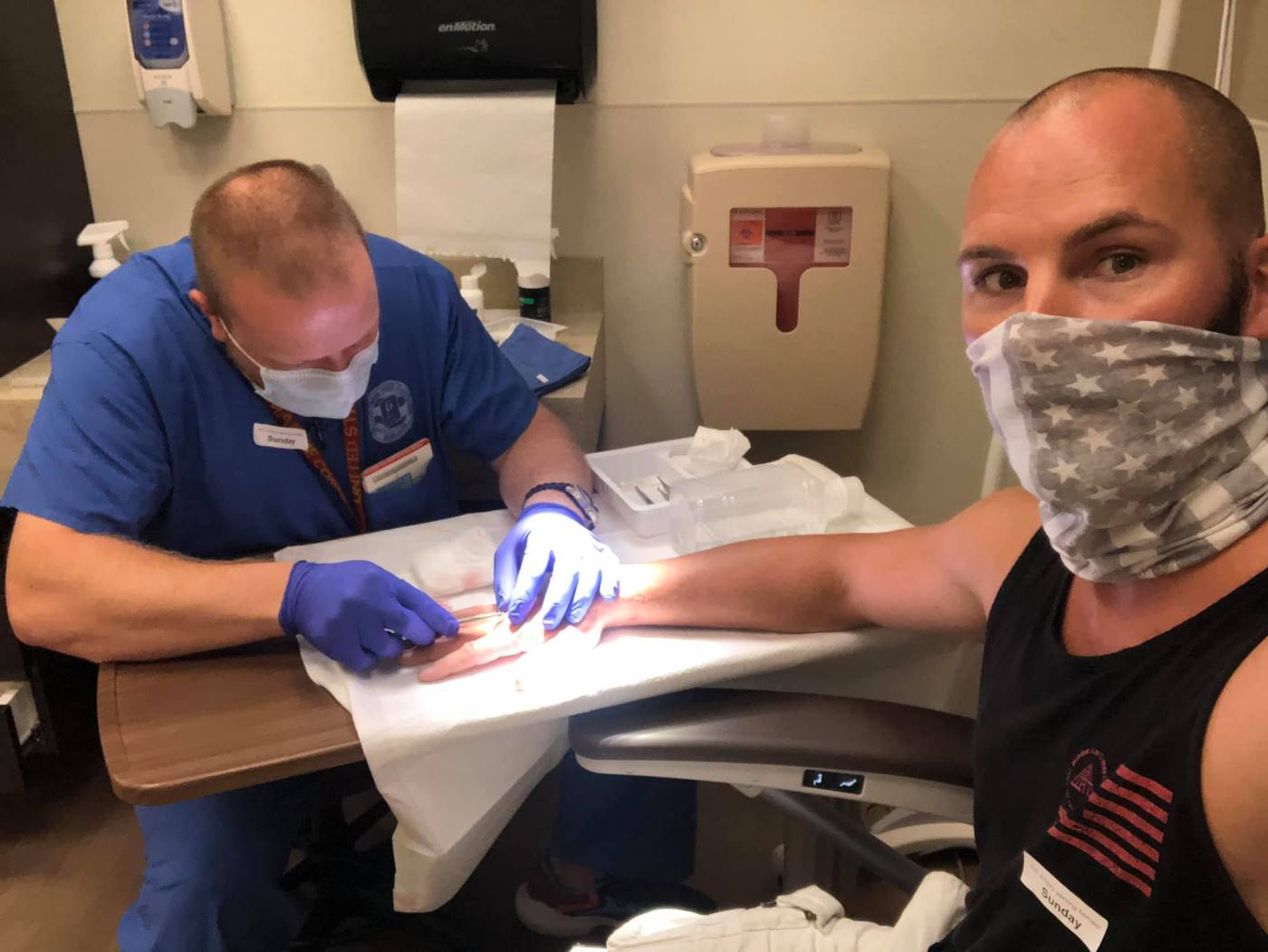When Max Zaruba sliced open his finger in a freak accident earlier this week, he wasn’t expecting a military reunion at the Milwaukee VA – especially with the doc who stitched his finger. The last time these two saw each other, they were enlisted Marine Corps infantry in Iraq.
His former infantry buddy, Matt Laudon, went to medical school after Iraq and is now Doctor Laudon, one of the Milwaukee VA’s Emergency Department physicians.
“What did you do?” Laudon asked his buddy as he walked in the room.
Both were wearing masks and Zaruba had no idea who he was.
“Do I know you?”
“It’s me! Laudon!”
“I had no idea he was even a doctor!” Zaruba said.
“I had just graduated from UW-Milwaukee and had been thinking of joining the military for a year. I just couldn’t shake the thought, so I joined the Marines. I wanted to get that enlisted feel, more in the dirt.”
Dr. Matthew Laudon, discussing his decision to become an infantryman in the Marines
Freak accident leads to Emergency Department visit
He was leaning backward in a chair when he fell back and put his hand through a whiteboard that shattered, with shards from the board slicing his finger down to the tendons.
“Literally, when it happened, I said, ‘Sonofab—-, now I have to go to VA.”
Both Marines served in the Reserve – Zaruba from 2004 to 2012, and Laudon from 2003 to 2009.
Laudon first went to Iraq, from 2004 to 2005, when he went to Yusufiyah. They both deployed to Habbaniyah from 2007 to 2008.

Dr. Matthew Laudon, who served in the Marines as an infantryman, had an unexpected reunion with one of his buddies who came to the Milwaukee VA for care.
“I had just graduated from UW-Milwaukee and had been thinking of joining the military for a year,” Laudon said. “I just couldn’t shake the thought, so I joined the Marines. I wanted to get that enlisted feel, more in the dirt.”
And like a lot of Marines, he got a rude awakening in boot camp.
“I’m standing on those yellow footprints and wondering, ‘What was I thinking?’ But you get that globe and anchor, it’s a big deal. Finishing the crucible, you feel like you’ve accomplished something.”
Iraq wasn’t easy for either of them.
“There were a lot of IEDs (roadside bombs), a lot of weapons caches. It was a hot spot with a lot of insurgents,” Zaruba said. “It was pretty terrifying at times and we lost a couple Marines.
“I just wanted to take part in bettering America and serving my country. I feel I made that impact on American freedom. We helped secure the town. We opened a couple schools, and a couple churches.”
Laudon said, like a lot of Iraq Vets, he and his team faced their share of combat with IEDs, mortars and indirect fire, and a major second battle in Fallujah.
“Infantry was tough,” he said. “Around that first tour, I start thinking about, Got [to go] back to medical school.”
Medical school after Infantry
He had a spot at the Medical College of Wisconsin in 2007 when the second deployment came up. They held his spot until he could return in 2009.
“I was 29,” Laudon said. “I was the oldest in my class. I didn’t have a connection to anyone else in my class. They were 22, 23. My age, my life experiences, it gave me a different perspective on life. It was hard to connect with those who hadn’t done as much.”
While he was in medical school, Zaruba opened a personal trainer studio and started HardWater Freaks, which specializes in year-round fishing excursions and does a lot of Veteran partnerships and fundraising with Wisconsin Hero Outdoors and other organizations.
“It’s always beneficial to see a familiar face take care of you. It’s even cooler that we served in Iraq together, had each other’s ‘six’ together, then you come home and he’s the one who fixes you up.”
Max Zaruba, after finding out his old infantry buddy was a doctor taking care of him at the Milwaukee VA.
Laudon completed his residency at Froedtert Hospital, but knew he wanted to work at the Milwaukee VA.
“I wear that Marine lanyard and my Marine Corps tag. I can connect easier. They tell me better stories, and really, they open up more with someone like me,” Laudon said.
“I kind of feel proud to be here and have a connection to serve them.”
It was a great experience for Zaruba.
“That was cool,” Zaruba said later. “I had no idea. It’s always beneficial to see a familiar face take care of you. It’s even cooler that we served in Iraq together, had each other’s ‘six’ together, then you come home and he’s the one who fixes you up.”
Laudon made his buddy promise to keep his hands out of lake water.
“That’s tough,” Zaruba said. “I’m usually out fishing three days a week.”
The two caught up on old times, old friends and old stories, the way old Veteran friends do when they see one another.
“You know, old times,” Laudon said. “The kind of things you can only talk about with those who served with you and went through it with you.”
The doc called him later in the week to check up and chat.
For Laudon, it reinforced his decision to practice medicine for his fellow Veterans and friends.
“That’s why I’m here,” he said, “to take care of my fellow brothers and sisters.”
Topics in this story
More Stories
Study underscores important role COVID vaccination can have in protecting Veterans from infection and reducing long-term health consequences
Columbia VA’s robotic surgery teams completed their 800th robotic surgery and are on schedule to hit 1,000 by the end of the year.
In a decentralized clinical trial, Veterans can participate from their own homes or local VA instead of having to travel to a research site.







